Top Infoblox Alternatives in 2026 [DNS + DDI]
Discover the best Infoblox alternatives for DNS security and full DDI. Compare Control D, BlueCat, EfficientIP & more to find the right fit for you.
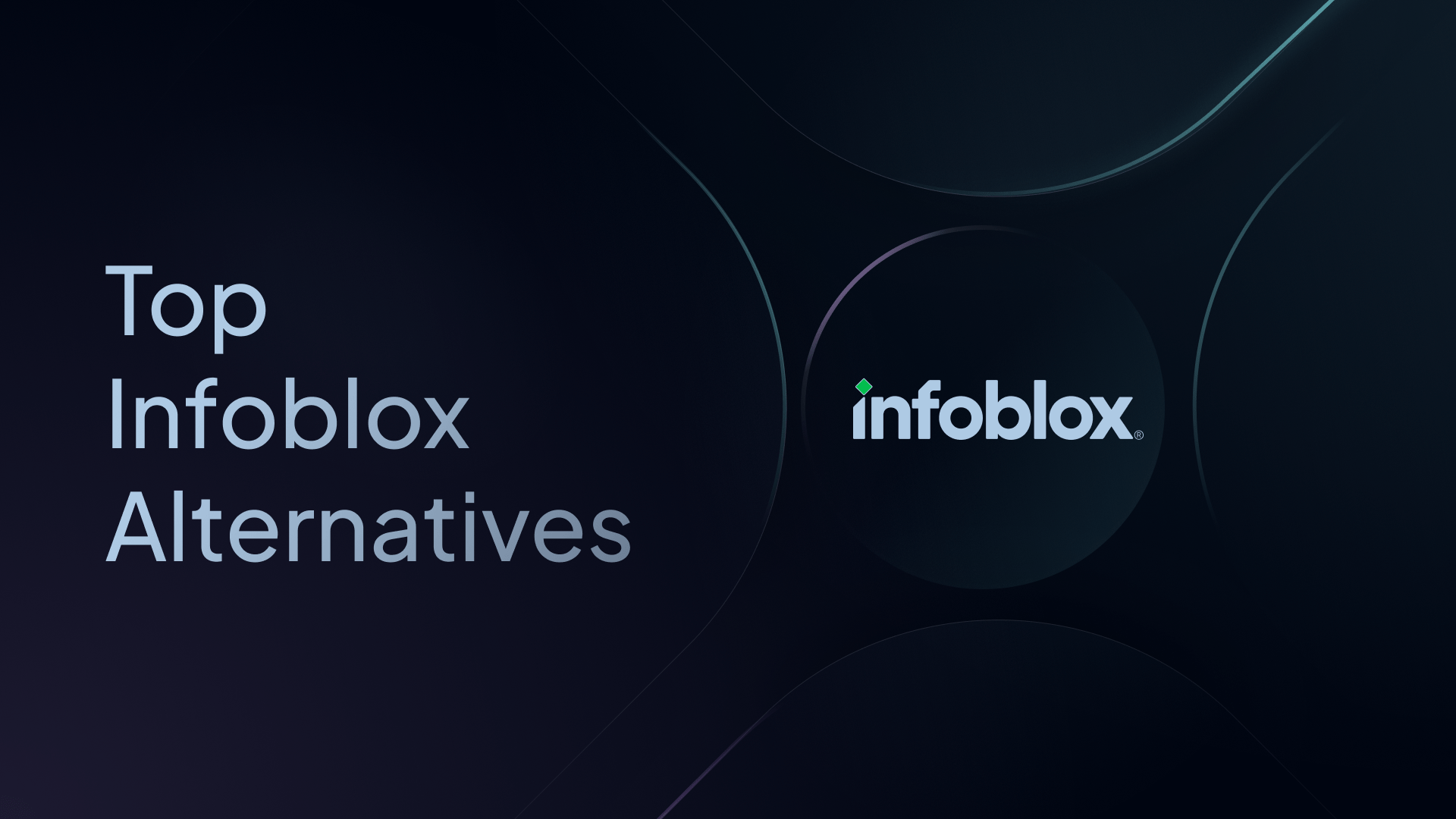
Infoblox offers two main products:
- Threat Defense – DNS-layer threat defense and content filtering
- Universal DDI Product Suite – DNS, DHCP, and IP Address Management solution
While both products work well, they often cost more than needed and can be too complicated for smaller teams. The good news is that there are plenty of alternatives.
Some focus on DNS security and filtering, such as blocking malicious domains, enforcing content policies, and ensuring fast, encrypted DNS resolution.
Others provide full DDI platforms, offering centralized control over DNS, DHCP, and IPAM (IP Address Management) for hybrid and multi-site environments.
This guide breaks down the top Infoblox alternatives across both categories. If you just need DNS protection, you’ll find modern, cloud-native tools that are easier to deploy and more affordable. If you require a full DDI replacement, we’ll highlight the top enterprise-ready solutions.
Top Infoblox Alternatives
For DNS Security & Filtering
| Rank | Alternatives | Best Suited For |
|---|---|---|
| 1 | Control D | Best overall Infoblox alternative for DNS security, privacy, and content control |
| 2 | Cisco Umbrella | Enterprise DNS security with Cisco ecosystem integration |
| 3 | Cloudflare Gateway | Fast, cloud-based DNS filtering with Zero Trust integrations |
| 4 | DNSFilter | AI-powered DNS protection |
| 5 | SafeDNS | Affordable content filtering |
Full DDI (DNS + DHCP + IPAM)
| Rank | Alternatives | Best Suited For |
|---|---|---|
| 1 | BlueCat Networks | Enterprise-grade DDI with strong automation and hybrid-cloud support |
| 2 | EfficientIP SOLIDserver | Comprehensive DDI with built-in DNS firewall and flexible licensing |
| 3 | Micetro | Multi-vendor orchestration overlay for DNS/DHCP/IPAM |
| 4 | Microsoft DNS + IPAM | Cost-effective DDI for Windows-centric environments |
Top Alternatives for Infoblox DNS Security & Filtering
1. Control D
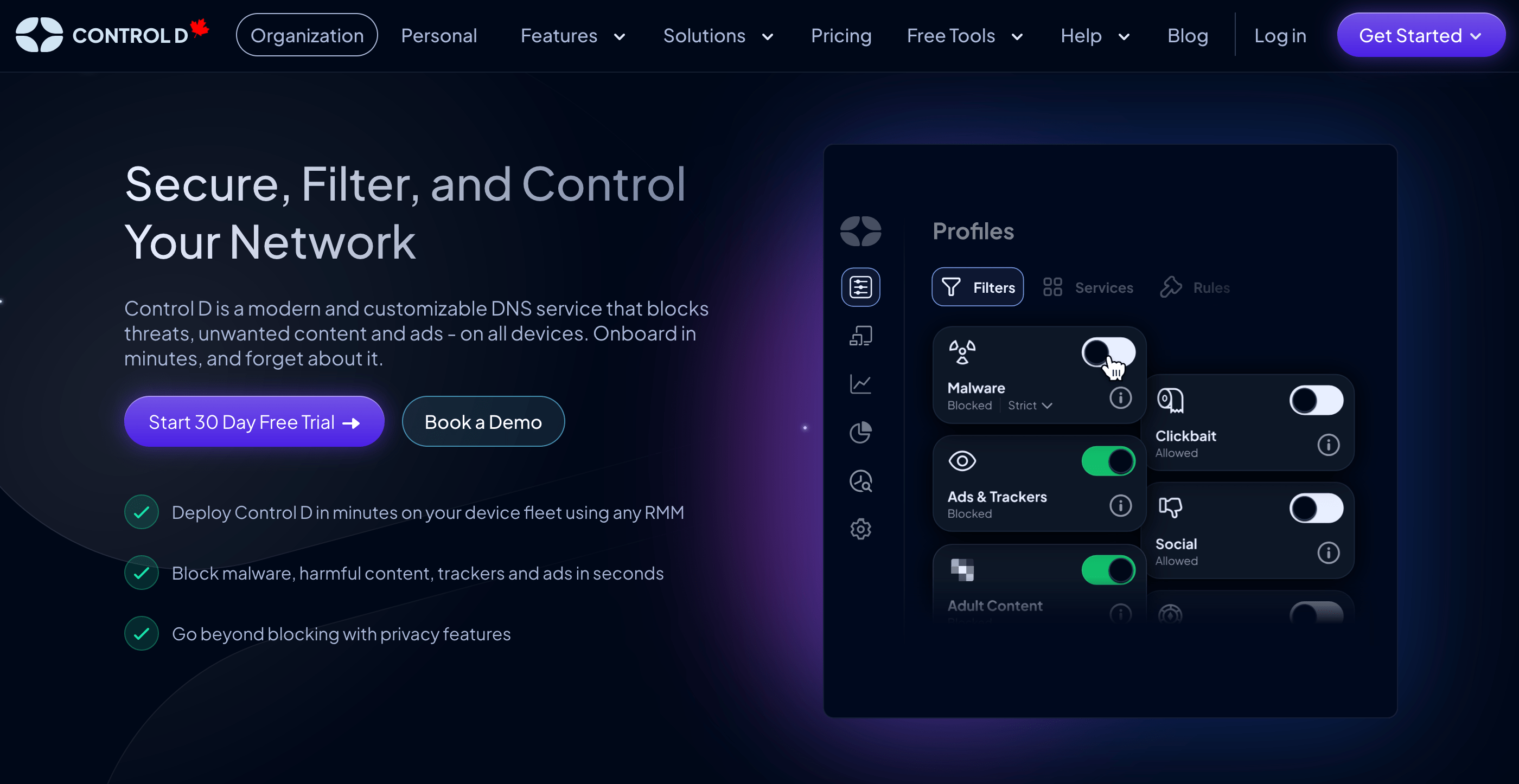
Control D is a cloud-based platform that offers enterprise-grade DNS security without the enterprise complexity or cost.
With features like full modern protocol support, unmatched policy customization, and real-time analytics – but in a way that’s far easier to deploy and manage – Control D provides the protection most teams look to Infoblox Threat Defense for, but with greater flexibility and transparency.
Let’s explore in detail why we recommend Control D as the top Infoblox DNS alternative.
How Does Control D Compare to Infoblox?
| General Features | Control D | Infoblox |
|---|---|---|
| Advanced ML-Based Malware Protection | ✅ | ✅ |
| Flexible Content Filtering | ✅ | ✅ |
| Blockable Services | 1,000+ | 469 |
| Geo-Custom Rules | ✅ | ❌ |
| Modern DNS Protocols | ✅ | DoH & DoT only |
| Traffic Redirection | ✅ | ❌ |
| Multi-Tenancy | ✅ | ✅ |
| Ad & Tracker Blocking | ✅ | ❌ |
| URL Filtering | ❌ | ✅ |
Infoblox’s Threat Defense sets itself apart by offering URL filtering, which Control D does not.
However, Control D delivers broader and more powerful functionality, along with features Infoblox doesn’t provide:
- Geo-Custom Rules – create policies based on where DNS traffic is coming from or going to (e.g., block queries from high-risk countries or ASNs)
- Traffic Redirection – mask your IP address by rerouting traffic through one of 100+ locations across 60+ countries
- Full API Access – Infoblox’s API abilities are limited to your plan; Control D gives you full access with no limitations from day one
- Ad & Tracker Blocking – Prevent ads and trackers from loading, choose from three blocking modes
- Modern DNS Protocols – Control D supports all major encrypted DNS protocols, including DoH, DoT, DoQ, and DoH/3; Infoblox only supports DoH and DoT
- Granular Content Blocking – Control D provides 20 Filters (categories) and 1,000+ Services (individual apps, tools, and platforms); Infoblox has only 469 Services, of which 112 are Amazon-related (e.g., AWS Backup, AWS AppSync, etc.)
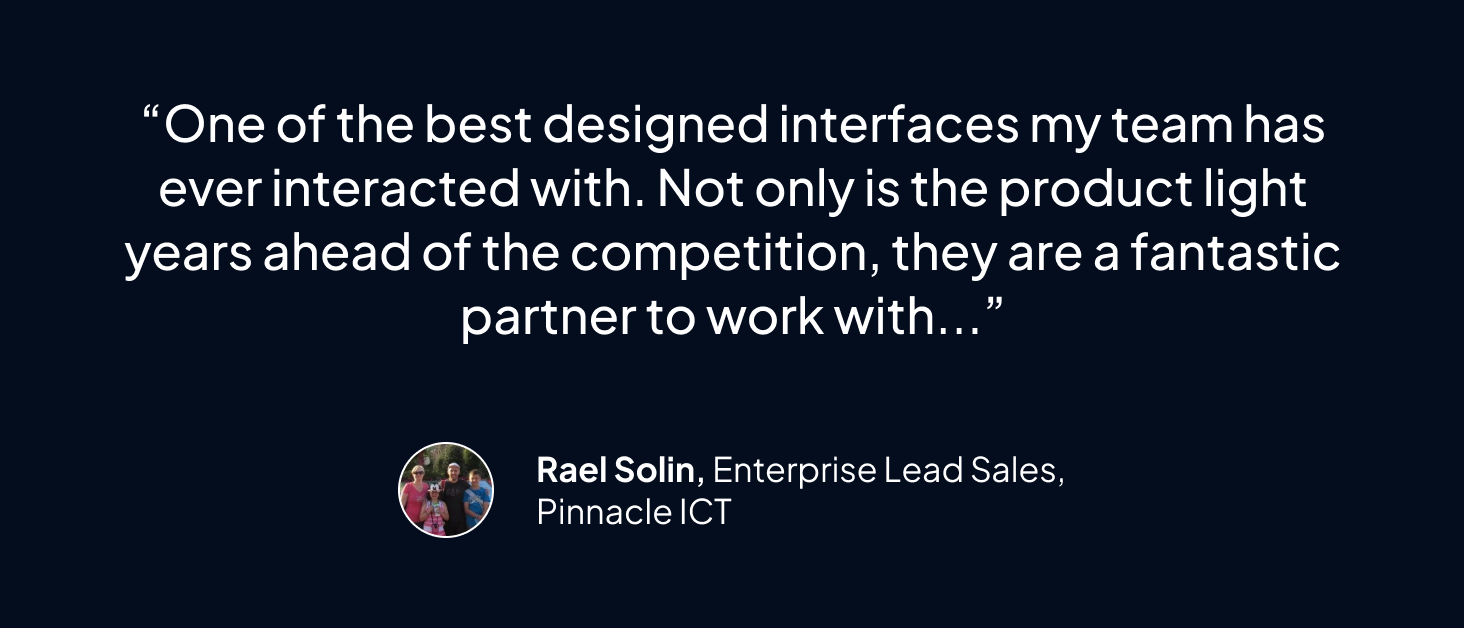
📊 Analytics & Reporting
Infoblox offers up to 60 days of query and analytics retention (with up to 1 year for security event logs), but data export is required for longer-term insights.
Control D offers:
- 30 days of raw query logs
- 30 days of hourly reports
- 1 year of daily analytics
- Built-in reporting tools (no add-ons needed; SIEM integration available)
- Data storage in NA, EU, AU, with custom region support
Bottom line: If you care about longer-term visibility, clean reporting, and flexibility on where your DNS data lives, Control D has a clear edge.
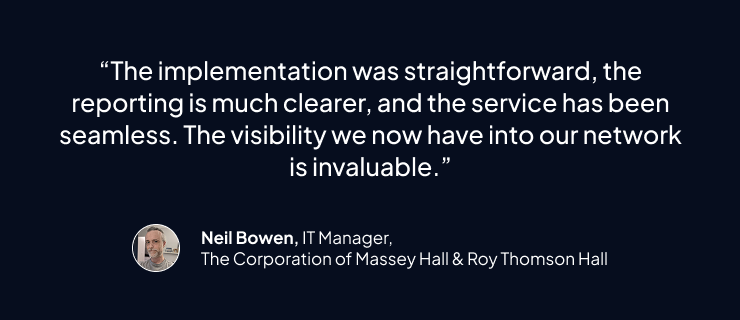
🛠️ Support
Getting help when you need it shouldn’t be complicated, but with Infoblox, it kind of is.
They offer three paid support tiers (called BloxCare), which are required add-ons if you want actual support. Each level costs more, and depending on your needs, support can end up being a big chunk of your total Infoblox bill.

Control D takes a completely different approach:
- All support channels (community, email, docs/knowledge base) are free, from day one
- You get a dedicated technical Account Manager by default, with access to the dev team when needed.
- 24/7 AI-powered support chatbot (Barry) that can answer 99% of queries
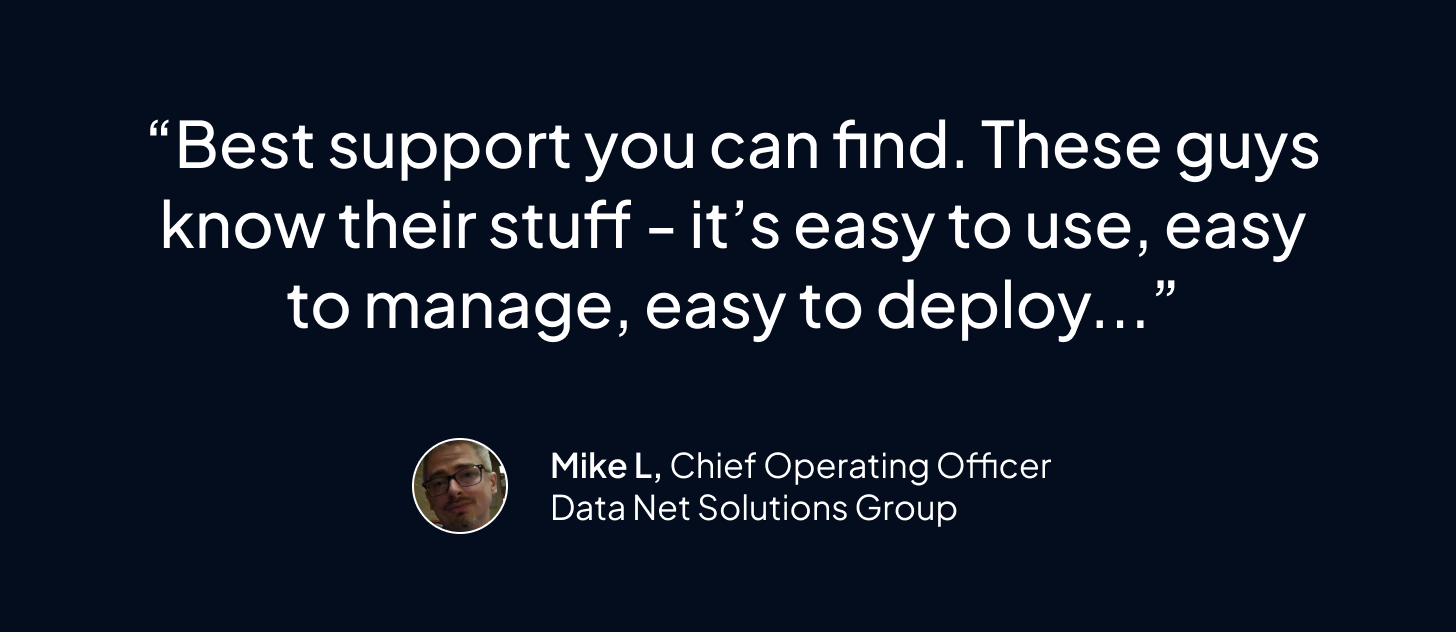
💰 Pricing
Infoblox pricing is quote-based and varies depending on deployment, user count, and support level. However, community feedback frequently cites Infoblox as typically expensive, especially for smaller organizations.

In contrast, Control D keeps pricing transparent and simple: no tiers, no upsells, and full access to all features from the start. Pricing is based only on organization type:
- School/Non-Profit: $0.50/endpoint/month
- MSP: $1/endpoint/month
- SMB: $2/endpoint/month
- Enterprise: Contact
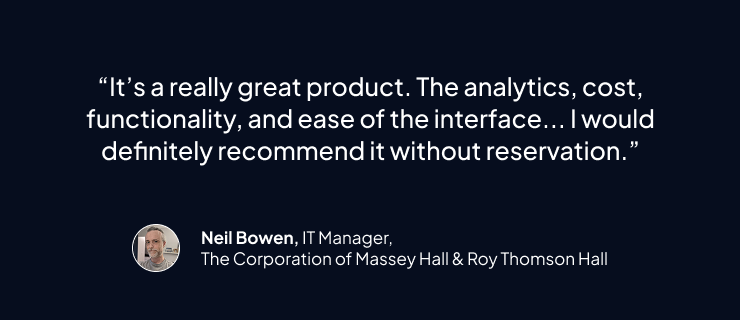
What are Control D’s Pros and Cons?
✅ Pros
- Best-in-class protection against malware (99.98% block rate), phishing, ads, and trackers
- Granular web and content filtering with unmatched customization
- Real-time analytics with clear, easy-to-use dashboards
- Fast, reliable DNS resolution across a global network
- Modern interface that’s easy to manage without technical expertise
- Extra features like Geo-Custom Rules and Traffic Redirection
- Full API access for automation and integrations
- Excellent customer support with responsive assistance
- No software installation required – works on any device or platform
❌ Cons
- No URL filtering
- Not a full DDI solution

2. Cisco Umbrella
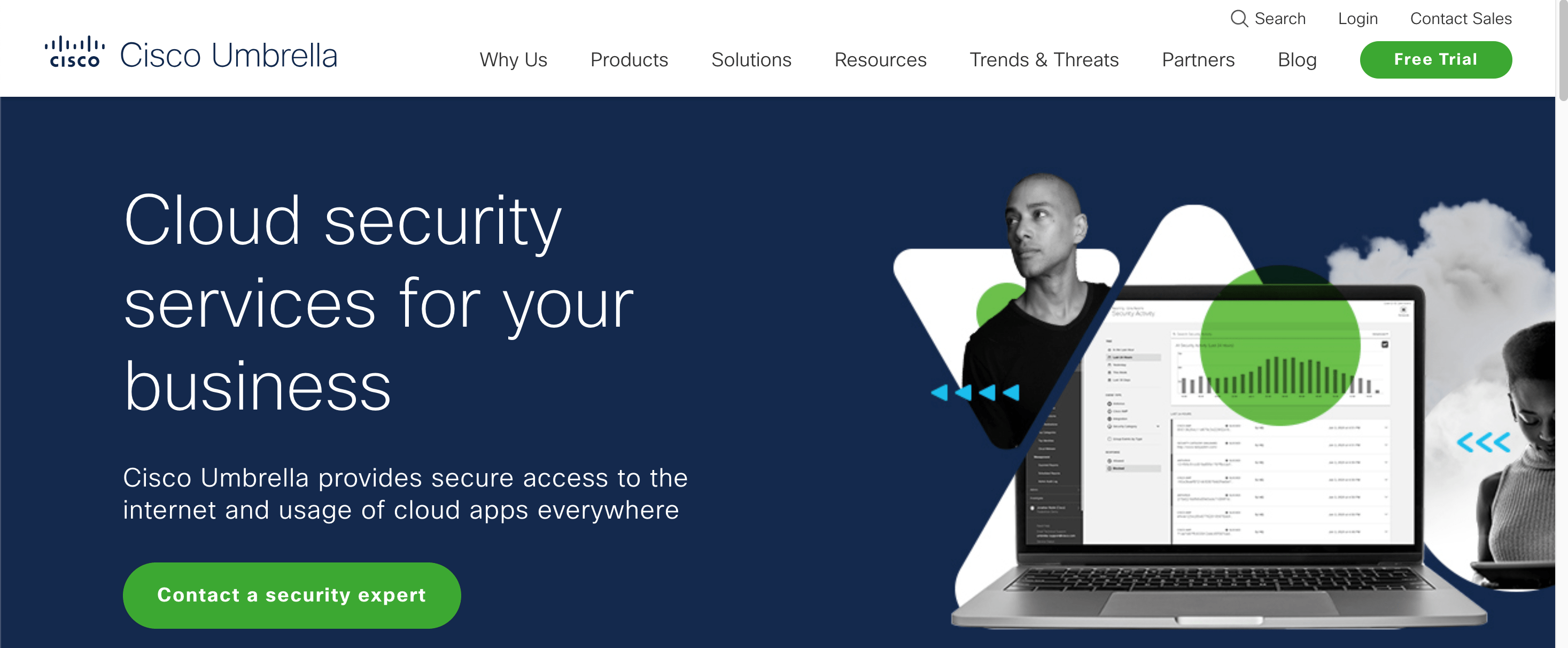
Cisco Umbrella (founded after acquiring OpenDNS in 2015) is one of the most recognized DNS security platforms. It has evolved into a comprehensive cloud security suite, featuring DNS filtering, a secure web gateway, firewall tools, and additional capabilities.
For large organizations – especially those already with other Cisco products – Umbrella will feel like a natural choice, since it integrates smoothly with the rest of Cisco’s ecosystem. That said, Umbrella isn’t exactly SMB-friendly.
Pricing is extremely high – it’s one of the most expensive DNS solutions on the market – and setup can be a little overwhelming without a dedicated IT team. Also, a lot of its value is only evident when paired with other Cisco products, which can be a barrier for small organizations.
Its basic DNS customization is also limited compared to platforms like Control D, and customer support reviews are mixed, with many users citing long wait times or unhelpful responses.
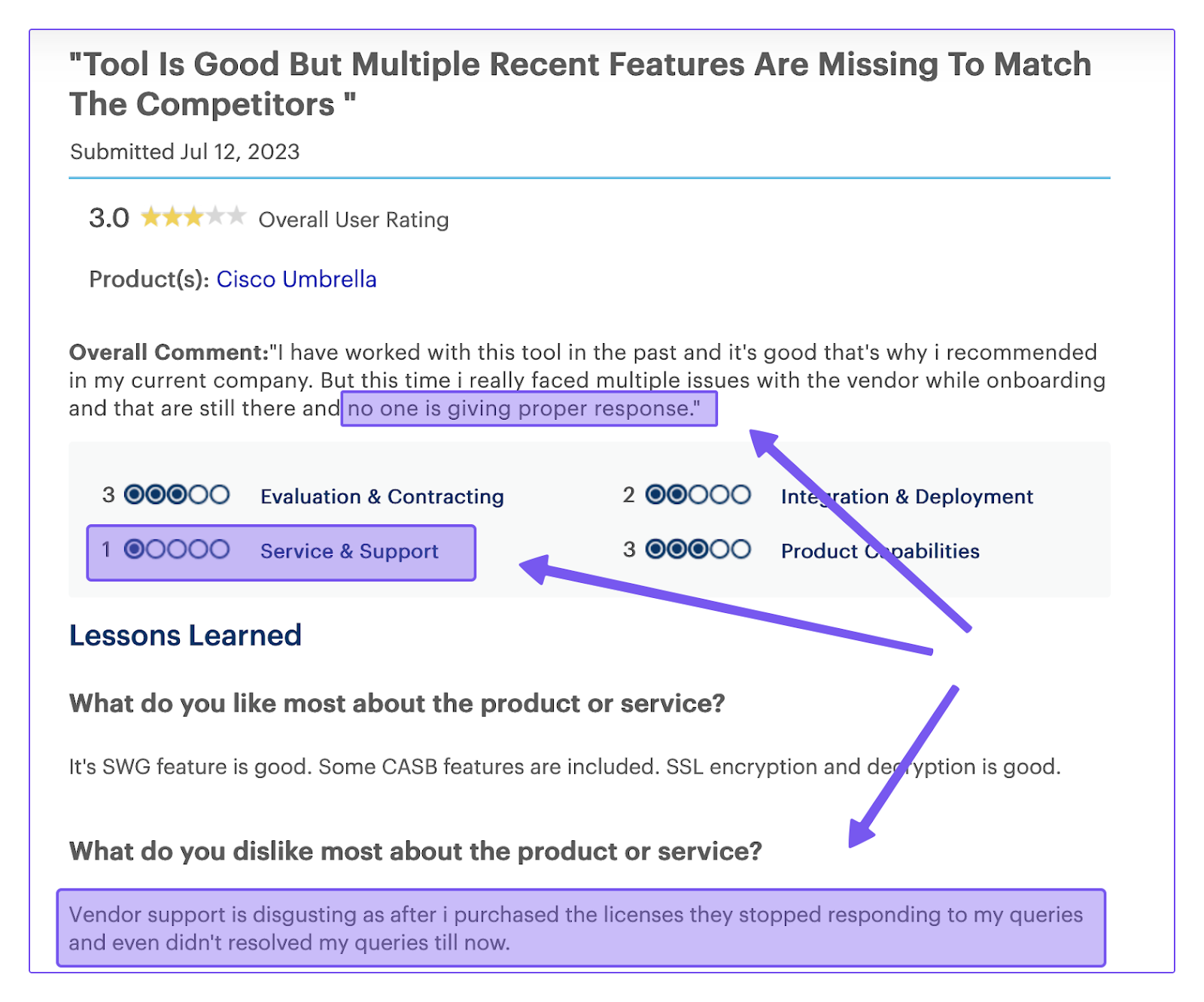
✅ Pros
- Backed by Cisco’s global threat intelligence
- Optional add-ons for secure web gateway and CASB
- Integrates smoothly with other Cisco security tools
❌ Cons
- Expensive at scale; advanced features locked to higher tiers
- Setup and interface can be intimidating for smaller teams
- Works best if you’re already invested in Cisco products
- Customer support is hit-or-miss
- Less DNS customization compared to Control D
- Overkill for organizations that only need DNS filtering
3. Cloudflare Gateway

Cloudflare Gateway is all about speed. It leverages Cloudflare’s global network for fast DNS resolution while enabling policy enforcement and content blocking at the DNS layer. Similar to Cisco Umbrella, if your company already leans on Cloudflare for things like CDN, DDoS protection, or Zero Trust access, adding Gateway to the mix makes sense.
But here’s the catch: Gateway’s strongest benefits are unlocked when you’re fully integrated into the Cloudflare ecosystem. On its own, it can feel a bit clunky – the dashboard isn’t exactly beginner-friendly, and many of the more advanced features are gated behind higher-priced plans.
On top of that, some users have flagged Cloudflare’s customer support as hit-or-miss, which can be frustrating if you encounter issues.
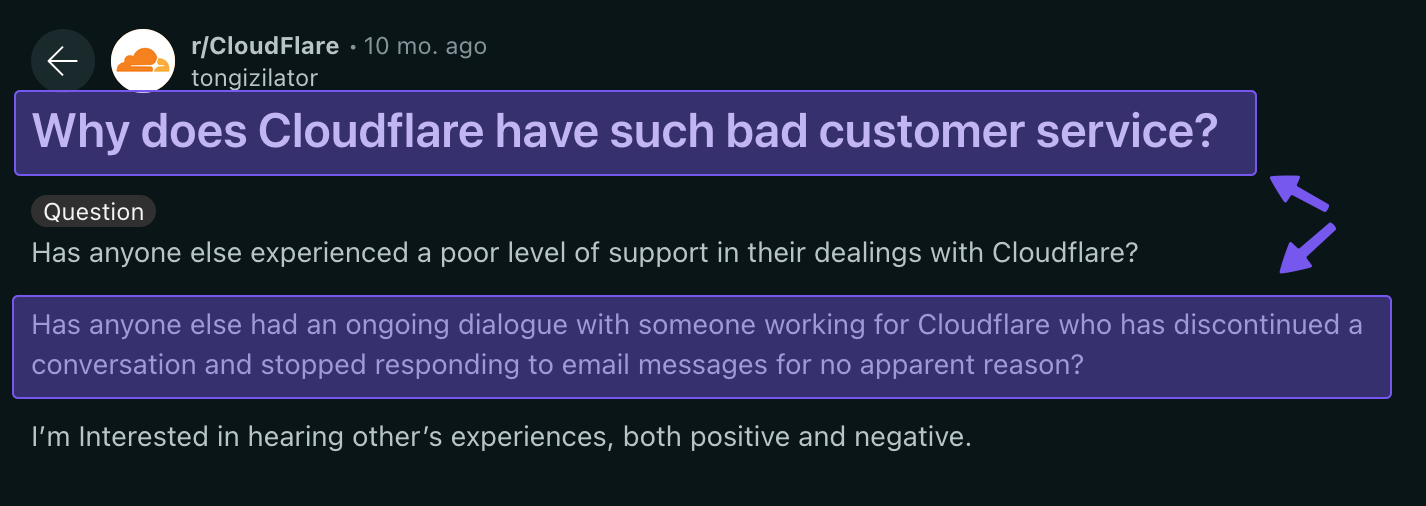
✅ Pros
- Lightning-fast DNS resolution
- Built-in DoH support
- Plays nicely with Cloudflare’s other security products
❌ Cons
- Purely DNS – no DHCP or IPAM
- Setup and interface can be confusing for first-timers
- Premium features require expensive plans
- Sub-par malware blocking
- Customization options are limited compared to Control D
- Customer support is inconsistent
4. DNSFilter
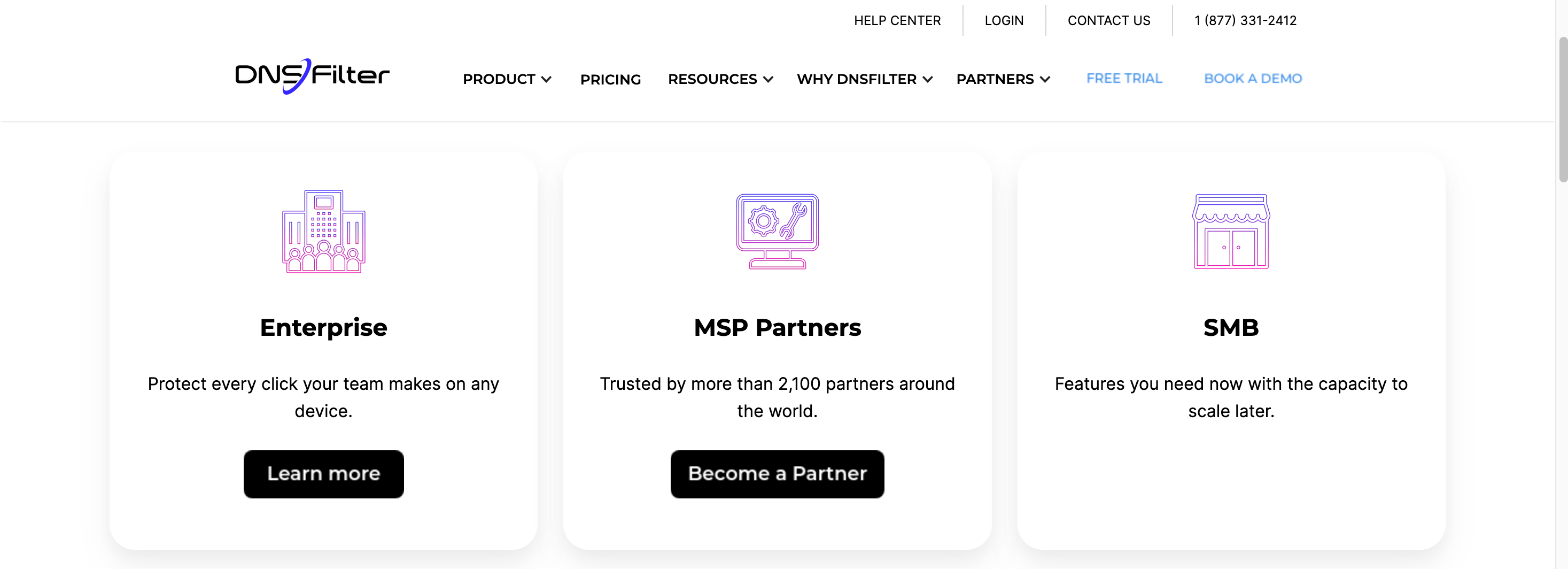
DNSFilter offers DNS-layer security that combines ease of use with powerful AI-driven threat detection. While it's not as deep as Infoblox Threat Defense in terms of advanced threat hunting, integrations, or predictive analytics, it offers a solid DNS security solution that's ideal for organizations seeking fast, simple protection without a steep learning curve.
The trade-off is that DNSFilter is best suited for straightforward deployments, rather than highly complex environments. It doesn’t support DNS-over-HTTPS (DoH), which is a notable gap given the industry’s shift toward encrypted DNS. Some advanced capabilities, such as exporting logs to a SIEM or detailed policy customization, also require higher-tier plans.
For organizations that need basic DNS security with minimal fuss, DNSFilter can work. But if you’re looking for deep control or enterprise-grade analytics, you might hit some limitations.
✅ Pros
- AI-driven threat detection and categorization
- Quick, hassle-free deployment with no hardware required
- Clear, user-friendly interface
❌ Cons
- Modest analytics and reporting compared to enterprise tools
- Extra costs for features like log exports and SIEM integration
- Filtering controls are less granular than other options
5. SafeDNS

SafeDNS takes a no-frills approach to DNS filtering. It’s designed to be simple, affordable, and effective for schools, small businesses, nonprofits, and even households that just want to block harmful or inappropriate sites.
The drawback is that SafeDNS only covers the basics. Its filtering is decent but not as advanced or customizable as other tools, and its reporting is fairly minimal. Enterprises that need deep analytics, geo-based controls, or full modern DNS protocol support will quickly run into its limits. For smaller teams, though, it’s an easy and budget-friendly way to get DNS protection in place.
✅ Pros
- Simple deployment
- Works consistently across devices and networks
- Affordable pricing plans with flexible user policies
- Covers essential content categories
❌ Cons
- Security features are less advanced than Infoblox or Control D
- Limited integrations, filtering customizations, and enterprise scalability
- UI and analytics are functional but basic
- No support for some modern DNS protocols
Top Infoblox Alternatives for Full DDI (DNS + DHCP + IPAM)
1. BlueCat Networks

BlueCat is a direct competitor to Infoblox in the enterprise DDI space. It offers a complete solution for managing DNS, DHCP, and IP address management (IPAM) in a single, centralized platform.
BlueCat’s biggest strengths lie in its automation capabilities and flexibility in hybrid or multi-cloud environments. Its API-first design allows you to integrate DDI into workflows and infrastructure-as-code deployments.
Compared to Infoblox, BlueCat offers more transparent pricing and emphasizes open integrations. However, it’s not a lightweight tool. It’s complex to deploy, requires a skilled IT team, and comes with a price tag to match.
For large enterprises, it’s a powerful Infoblox alternative. For smaller organizations, it can feel excessive.
✅ Pros
- Full enterprise-grade DDI suite (DNS, DHCP, IPAM)
- Excellent automation and DevOps integrations
- Strong support for hybrid and multi-cloud deployments
- Strong visibility and network policy control
❌ Cons
- Complex and costly for smaller environments
- Steeper learning curve for administrators
- May be too heavy for smaller organizations
2. EfficientIP SOLIDserver

EfficientIP’s SOLIDserver offers a complete DDI platform with a strong emphasis on security. It includes DNS firewalling, encrypted DNS support (DoH, DoT), and metadata-rich IPAM that gives you better context into how IP addresses are being used.
EfficientIP often markets itself as a more affordable and flexible alternative to Infoblox, with transparent pricing and migration support that make switching easier.
That said, the interface can feel dense, and the learning curve is real – especially for smaller teams without deep networking experience. However, for enterprises that want full DDI coverage at an often lower Total Cost of Ownership (TCO) than Infoblox, SOLIDserver is a strong option.
✅ Pros
- Full DDI suite plus built-in DNS firewall and encryption
- Transparent pricing and lower total cost of ownership claims
- Migration paths tailored to Infoblox users
- Lower total cost of ownership vs. Infoblox
❌ Cons
- Heavy interface and steeper onboarding experience
- Smaller ecosystem and community than BlueCat or Infoblox
- Documentation can be limited; less accessible for non-technical operators
3. Micetro

Micetro is a little different from the other DDI players. Instead of replacing DNS, DHCP, and IPAM infrastructure, it acts as an overlay platform that unifies management across multiple backends, including Microsoft DNS, BIND, AWS Route 53, Azure DNS, and even Infoblox itself.
That makes it perfect for hybrid or multi-vendor environments where ripping and replacing isn’t realistic. Its API-first design also makes it a hit with teams looking to automate DDI tasks across different systems.
The catch is that Micetro isn’t a standalone DDI solution. It depends on existing DNS/DHCP infrastructure, so it won’t simplify life much if you’re looking for an all-in-one replacement. But for organizations juggling different platforms, it’s a useful way to consolidate control without overhauling your entire infrastructure
✅ Pros
- Overlay management across multi-vendor DNS/DHCP/IPAM systems
- Excellent for hybrid and multi-cloud environments
- Strong automation and API integrations
- Reduces vendor lock-in by working with existing infrastructure
❌ Cons
- Doesn’t provide native DNS/DHCP/IPAM servers (relies on existing infrastructure)
- Requires integration/configuration with each backend system
- Fewer built-in DNS security features
- Limited usefulness for small orgs with simple setups
4. Microsoft DNS with IPAM (Windows Server Built-In DDI)

For organizations that are already heavily invested in Microsoft, Windows Server’s built-in DNS and IPAM features can be a cost-effective alternative to Infoblox. It lets you centrally manage DNS zones, DHCP leases, and IP addresses inside Active Directory environments. The interface will feel familiar to Windows users, and role-based access control helps with compliance in larger teams.
Of course, you get what you pay for. Microsoft’s DNS/IPAM lacks the advanced automation, analytics, and multi-cloud support typically found in enterprise-grade DDI platforms. It’s really only suitable for Windows-centric networks that don’t need all the bells and whistles – but for SMBs, it’s a low-cost, practical option.
✅ Pros
- Included with Windows Server (no extra licensing)
- Centralized DNS, DHCP, and IPAM in Microsoft environments
- Familiar tools for Windows admins (Server Manager, PowerShell)
- Role-based access and auditing support
❌ Cons
- Limited to Microsoft DNS/DHCP – can’t manage BIND, cloud DNS, or third-party DHCP servers
- No cloud-native deployment or hybrid-cloud integrations
- Limited automation and customization compared to enterprise-grade DDI solutions
- Requires manual setup and Active Directory configuration to function effectively
How to Choose the Right Infoblox Alternative
Every Infoblox alternative comes with its own mix of strengths, and it can be tempting to get lost in feature lists. But the best Infoblox replacement for you also depends on your use case, team size, and budget. Here are the big factors to consider when narrowing down your options:
1. Determine Your Use Case
Start by asking the key question:
- Do you need a full DDI platform to manage DNS, DHCP, and IP address management?
- Or do you mainly need DNS security and filtering to block threats and control web access?
If you only need DNS protection, you’ll save money and reduce complexity by choosing a lightweight, cloud-based option like Control D.
If you’re managing complex, hybrid environments with heavy DHCP/IPAM use, a true DDI alternative makes more sense.
2. Focus on What Matters Most
Think about your top priorities:
- Security: Standard threat feeds vs. real-time, machine-learning–driven threat intelligence
- Ease of Use: Simple dashboards vs. complex enterprise consoles
- Visibility & Reporting: Short-term log access vs. long-term analytics and retention
- Policy Control: Simple category filters vs. granular, customizable rules
- Scalability: Single office vs. multi-site or multi-cloud
- Cost: Budget-friendly SaaS vs. enterprise licensing
Keeping these priorities in mind will make it easier to choose the right fit without overpaying for features you don’t actually need.
3. Consider Support and Ecosystem Fit
A polished UI means little if the service disappears next year, fails to patch security issues, or doesn’t integrate well with your existing workflow. Look for:
- Fast, responsive, and helpful support
- Regular updates with release notes
- Accessible documentation and onboarding resources
- Ability to integrate the platform with your existing security stack and workflow
Final Thoughts
Choosing the right Infoblox alternative depends on how much infrastructure you really need to manage.
- If you only need DNS security and filtering, platforms like Control D offer enterprise-grade protection at a significantly lower cost and complexity.
- If you rely heavily on DDI functions such as DHCP and IPAM, enterprise solutions like BlueCat or EfficientIP are a stronger fit.
The key is to match the solution to your real needs.


